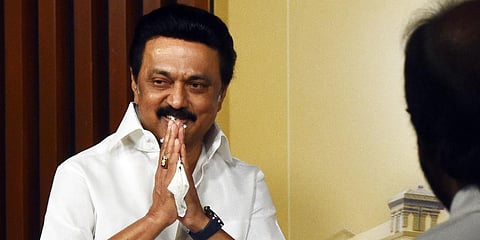

Tamil Nadu Chief Minister MK Stalin on Tuesday said his state stood in "full support" of the Kerala government in its efforts to challenge the "arbitrary and discriminatory borrowing norms" imposed by the Centre on some states, including Kerala and Tamil Nadu. He also informed his Kerala counterpart Pinarayi Vijayan that DMK will attend the protest by the Kerala Cabinet in New Delhi on February 8.
"Although this (discrimination) has been happening for quite some time, the situation has rapidly deteriorated in the last few years and there is a clear consensus emerging amongst progressive State governments that such indirect control over state finances needs to be done away with...
"The intent seems to be aimed at crippling States' ability to raise resources and fund crucial developmental initiatives as per their policy priorities. This needs to be resisted by like-minded progressive states," he said in an open letter to Kerala Chief Minister Pinarayi Vijayan.
Two months ago, Kerala had approached the Supreme Court against the Union government's attempts to deny permission to the state to raise debt to fund fiscal deficit.
"If the State is not able to borrow to the extent required based on the budget of the State, the State would not be able to complete its State Plans for the particular financial year. Therefore, it is essential for the progress, prosperity and development of the State and the people of the State that the State is able to exercise its constitutional rights and its borrowings are not impeded in any manner," the suit said.
Kerala also challenged the insertion of the term 'general government debt' into the Fiscal Responsibility and Budget Management Act, 2003 in such a way as to restrict the freedom available to state governments to borrow money from the market.
“Public Debt of the State” is an item exclusively in the State List in the Seventh Schedule under Article 246 of the Constitution. The Impugned Amendments, which are ultra vires the Constitution would potentially be used to thwart the powers of the Plaintiff State," Kerala said.
The suit sought that the Supreme Court should declare that the Union government has no "right, power or authority" to regulate, interfere with, fetter, limit and/ or impose any conditions on the borrowings by the state.
Tamil Nadu's Position
Stalin lent his full support to Kerala's position and said the 'arbitrary' restrictions are crippling the state's growth.
"..the subject of Public Debt for financing the public expenditure of States is within the exclusive purview of the State Legislature as per the Constitution of India. However, the Union Government has been misusing its powers under article 293 of the Constitution of India to restrict the borrowing space of the States. The prior consent from Union Government, mandated by this section, has been converted into a restrictive tool to limit deficit financing beyond the limits" prescribed by the Fiscal Responsibility and Budget Management Act, he said.
Stalin also gave three examples of instances where his state was unable to raise funds because of such restrictions, including Centre's refusal to fund the Chennai Metro's second phase.
"1. For the year 2023-24, the Union Government has fixed the gross state domestic product [state GDP] growth for calculating the net borrowing ceiling at a mere 8%, despite the state consistently achieving around 15% nominal growth in the last two years. This has resulted in a loss of Rs.6,000 crore in borrowing space in the current year.
"2. The mandatory condition of funding gross losses of State DISCOMS under the guidelines for additional borrowing for power sector reforms has forced Tamil Nadu to provide Rs.17,111 crore to TANGEDCO in the current year. This has severely constrained our fiscal space this year and is likely to affect us in the future also.
"3. The intentional delay in approving the Chennai Metro Rail Phase-II project as a Central Sector project has resulted in the entire debt of Rs.33,594 crore for the project being included within the State's net borrowing ceiling," he noted.
"I stand in full support of the Government of Kerala's commitment to preserving fiscal federalism. The Government of Tamil Nadu is ready to extend its cooperation in this regard and we look forward to collaborate and synchronise our efforts to address this crucial challenge," he added.
The move has come in the context of increasing rhetoric alleging that the Union government is discriminating against South Indian states, particularly in terms of sharing tax money.
Presenting the state budget, Kerala finance minister KN Balagopal pointed out that Kerala goverment gets only Rs 21 from every 100 rupees collected as tax from the state.
In contrast, he pointed out, Bihar state government gets to keep Rs 70 for every Rs 100 collected as tax from the state, with the remaining going to the Centre.
"Do we need any other better proof than the statistics of RBI? In the divisible pool of tax collected by the Centre, which is to be devolved among the states, 3.87% was Kerala's share during the 10th Finance Commission period. This has come down to 2.5% in the 14th Finance Commission and to 1.93% in the 15th Finance Commission. It is now a well-known fact that Kerala has lost tens of thousands of crores as a result of this," he said.
Meanwhile, Bangalore Rural MP from Karnataka, DK Suresh last week said people of South India might have to demand a separate country if “the injustice of not providing the rightful share of taxes (to the southern states) continued”.
"Today, if we see the share of taxes distributed, North India is getting more. From us (Karnataka) more than Rs 4 lakh crore is collected every year under various taxes. How much are we getting back," he asked.